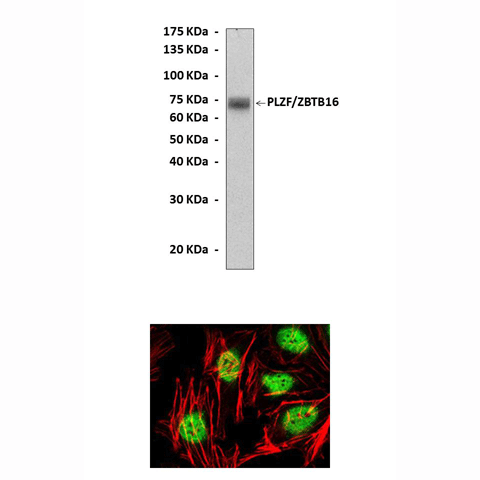Product Sheet CP10261
Description
BACKGROUND PLZF/ZBTB16 was initially identified as a fusion partner of retinoic acid receptor α (RARα) in a variant chromosomal translocation t(11;17)(q23;q21) that occurred in a subset of acute promyelocytic leukemia patients. PLZF/ZBTB16 is a transcriptional repressor of the POK (POZ and Krüppel) family of proteins. It contains one BTB (Broad complex, Tramtrack, and Bric à brac)/POZ (poxviruses and zinc finger and Krüppel) domain at the NH2-terminal moiety and 9C2H2 Krüppel-type zinc fingers at the carboxyl-terminal end of the protein. The POZ/BTB domain mediates interactions with proteins such as transcriptional co-repressors entailing chromatin remodeling and transcriptional silencing. The Krüppel-type zinc fingers confer specificity of the repressor activity to particular promoters by interacting with corresponding response elements in regulatory regions of genes repressed by PLZF/ZBTB16. The hinge region of the protein contains a PEST domain with two consensus sites for CDK2-mediated phosphorylation that triggers ubiquitination and subsequent degradation of PLZF through the ubiquitin-proteasome pathway. The human PLZF/ZBTB16 gene maps to chromosome 11q22–q23 with seven exons distributed over a region of approximately 200 kb. Although additional alternative transcripts encoding distinct proteins have been reported, most recent NCBI and Ensembl databases contain 2 and 3 transcripts, respectively, that differ only in their 5′ untranslated region and thus encode the same protein.1
Regarding its function, a natural mutation (luxoid) in, and knock-out of, the mouse homologue Zfp145/ZBTB16 unraveled a crucial role in limb and skeletal patterning and spermatogonial stem cell maintenance. PLZF/ZBTB16 has further been implicated in tumor suppression in melanoma and prostate cancer, ascribed to its ability to cause cell cycle arrest and induce apoptosis in certain cell systems.2 The complex effects of PLZF/ZBTB16 have been associated with transcriptional repression of numerous genes such as members of the Hox family of transcription factors, kit, CRABPI, c-myc, CCNA2/Cyclin A, CDKN1B/p27/Kip1 and possibly others. Glucocorticoids (GCs) cause cell cycle arrest and apoptosis in lymphoid cells which is exploited to treat lymphoid malignancies. It was shown that PLZF/ZBTB16 is a glucocorticoid response gene in acute lymphoblastic leukemia. Thus, The suggested role of PLZF/ZBTB16 in cell cycle arrest and apoptosis induction in some systems, further supported a possible role of PLZF/ZBTB16 induction in the anti-leukemic glucocorticoid (GC) response.3 In addition, PLZF/ZBTB16 also plays a role in suppressing the proliferation of normal cultured human corneal endothelial cells. The expression of PLZF in HCECs is closely related to the formation of cell-cell contacts.4
Regarding its function, a natural mutation (luxoid) in, and knock-out of, the mouse homologue Zfp145/ZBTB16 unraveled a crucial role in limb and skeletal patterning and spermatogonial stem cell maintenance. PLZF/ZBTB16 has further been implicated in tumor suppression in melanoma and prostate cancer, ascribed to its ability to cause cell cycle arrest and induce apoptosis in certain cell systems.2 The complex effects of PLZF/ZBTB16 have been associated with transcriptional repression of numerous genes such as members of the Hox family of transcription factors, kit, CRABPI, c-myc, CCNA2/Cyclin A, CDKN1B/p27/Kip1 and possibly others. Glucocorticoids (GCs) cause cell cycle arrest and apoptosis in lymphoid cells which is exploited to treat lymphoid malignancies. It was shown that PLZF/ZBTB16 is a glucocorticoid response gene in acute lymphoblastic leukemia. Thus, The suggested role of PLZF/ZBTB16 in cell cycle arrest and apoptosis induction in some systems, further supported a possible role of PLZF/ZBTB16 induction in the anti-leukemic glucocorticoid (GC) response.3 In addition, PLZF/ZBTB16 also plays a role in suppressing the proliferation of normal cultured human corneal endothelial cells. The expression of PLZF in HCECs is closely related to the formation of cell-cell contacts.4
REFERENCES
1. McConnell, M.J. & Licht, J.D.: Curr. Top. Microbiol. Immunol. 313:31-48, 2007
2. Costoya, J.A. & Pandolfi, P.P.: Curr. Opin. Hematol. 8:212-7, 2001
3. Wasim, M. et al: J. Steroid Biochem. Mol. Biol. 120:218-27, 2010
4. Joko, T. et al: Mol. Vis. 13:649-58, 2007
2. Costoya, J.A. & Pandolfi, P.P.: Curr. Opin. Hematol. 8:212-7, 2001
3. Wasim, M. et al: J. Steroid Biochem. Mol. Biol. 120:218-27, 2010
4. Joko, T. et al: Mol. Vis. 13:649-58, 2007
Products are for research use only. They are not intended for human, animal, or diagnostic applications.
Details
Cat.No.: | CP10261 |
Antigen: | Purified recombinant human PLZF/ZBTB16 fragments expressed in E. coli. |
Isotype: | Mouse IgG1 |
Species & predicted species cross- reactivity ( ): | Human, Mouse, Rat |
Applications & Suggested starting dilutions:* | WB 1:1000 IP n/d IHC n/d ICC 1:50 - 1:200 FACS n/d |
Predicted Molecular Weight of protein: | 74 kDa |
Specificity/Sensitivity: | Detects PLZF/ZBTB16 proteins without cross-reactivity with other related proteins. |
Storage: | Store at -20°C, 4°C for frequent use. Avoid repeated freeze-thaw cycles. |
*Optimal working dilutions must be determined by end user.
Products
| Product | Size | CAT.# | Price | Quantity |
|---|---|---|---|---|
| Mouse PLZF/ZBTB16 Antibody: Mouse PLZF/ZBTB16 Antibody | Size: 100 ul | CAT.#: CP10261 | Price: $413.00 |

